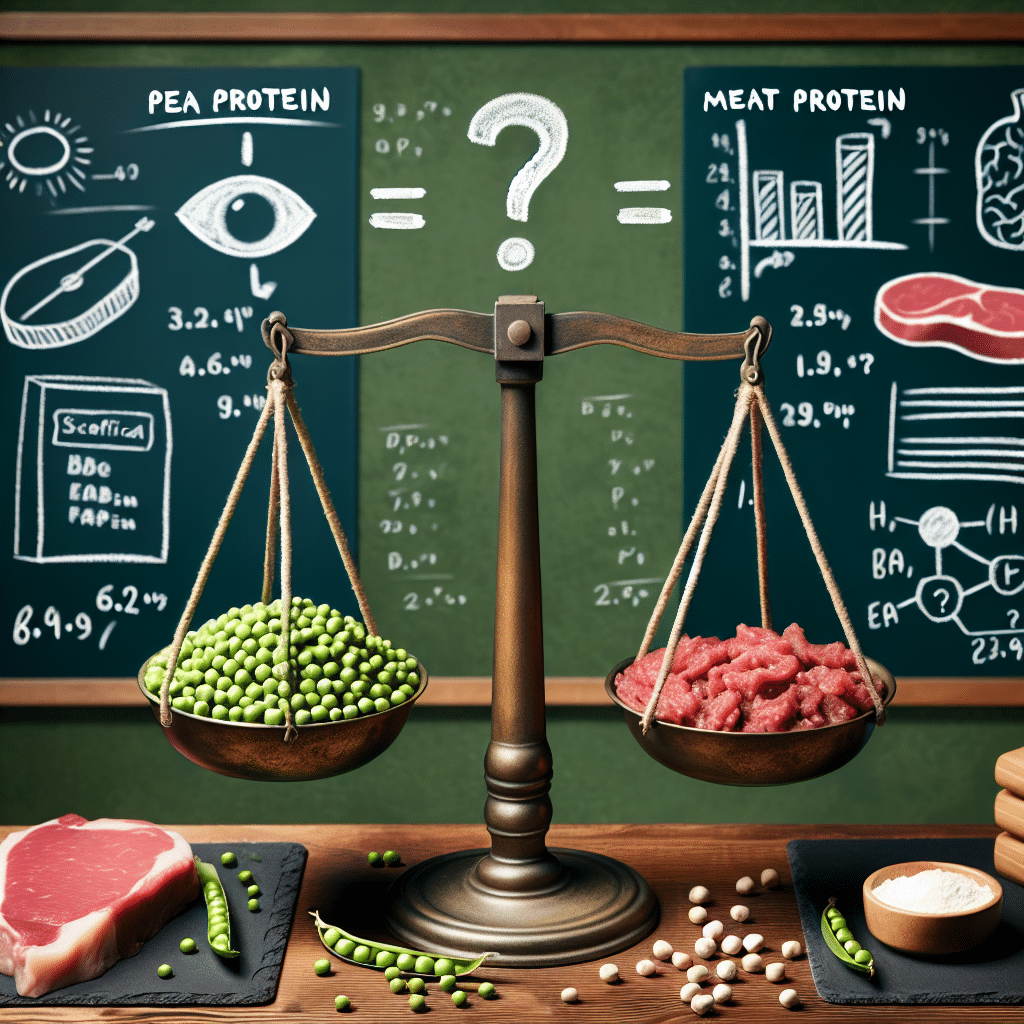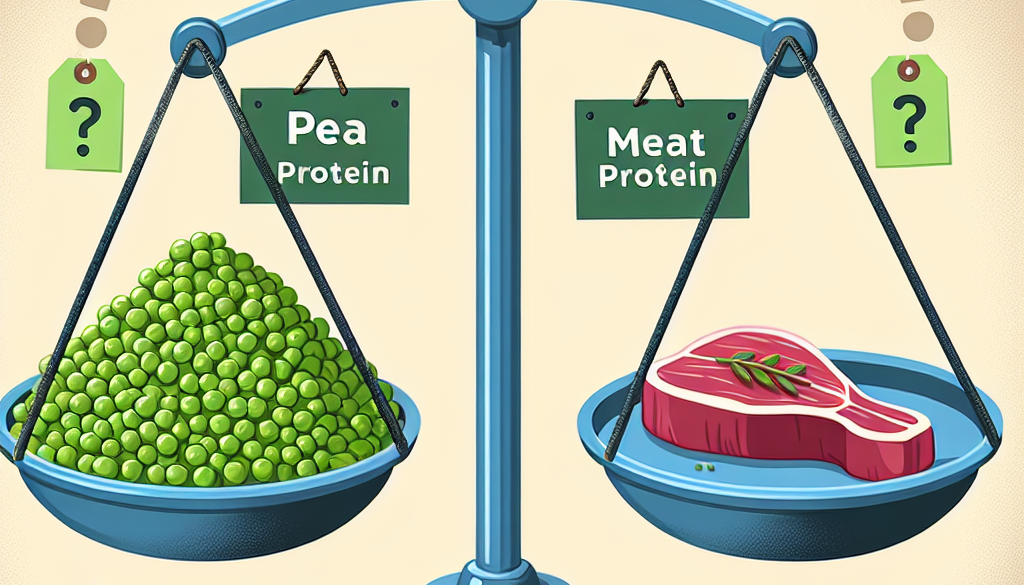Is Pea Protein Better Than Meat Protein? Discover More
Table of Contents
Pea Protein vs. Meat Protein: Which is the Superior Source?

When it comes to protein sources, the debate between plant-based and animal-based options is ongoing. Pea protein, a relatively new contender in the protein supplement market, has been gaining popularity as a viable alternative to traditional meat protein. This article delves into the comparison between pea protein and meat protein, examining their nutritional profiles, environmental impact, health benefits, and potential drawbacks.
Nutritional Comparison
Understanding the nutritional content of pea protein and meat protein is crucial to determining which might be better suited for your dietary needs.
- Amino Acid Profile: Meat protein is known for being a complete protein, containing all nine essential amino acids. Pea protein is also rich in amino acids, though it has lower amounts of methionine and cysteine. However, when combined with other plant proteins, it can provide a complete amino acid profile.
- Protein Content: Meat typically offers a higher protein content per serving compared to pea protein. However, pea protein isolates are concentrated and can provide a comparable amount of protein per scoop.
- Digestibility: Animal proteins are generally more digestible than plant proteins. However, pea protein is among the more digestible plant proteins, with a digestibility score close to that of meat.
- Nutrient Density: Meat provides additional nutrients such as vitamin B12, zinc, and iron. Pea protein is also rich in iron and can be fortified with other nutrients.
Health Implications
Both pea protein and meat protein have unique health implications that should be considered when choosing a protein source.
- Heart Health: Pea protein is naturally cholesterol-free and low in saturated fat, making it a heart-healthy option. Some studies suggest that red meat, particularly processed meat, may be linked to an increased risk of heart disease.
- Digestive Health: Pea protein is often easier on the digestive system for those who are sensitive to dairy or other animal proteins. It also contains fiber, which can aid in digestion.
- Allergies and Intolerances: Pea protein is hypoallergenic and free from common allergens found in dairy, soy, and wheat proteins, making it a safe choice for many individuals with food sensitivities.
Environmental Impact
The production of pea protein generally has a lower environmental footprint compared to meat protein.
- Greenhouse Gas Emissions: The livestock industry is a significant contributor to greenhouse gas emissions. In contrast, the cultivation of peas requires less energy and produces fewer emissions.
- Land and Water Use: Growing peas uses less land and water than raising livestock, making pea protein a more sustainable choice.
- Biodiversity: Pea cultivation can be part of crop rotation practices that enhance soil health and biodiversity, whereas large-scale meat production can lead to habitat destruction and species loss.
Ethical Considerations
For many consumers, ethical considerations play a role in their choice of protein source.
- Animal Welfare: Plant-based proteins like pea protein offer an alternative for those concerned about animal welfare issues associated with the meat industry.
- Accessibility: Pea protein can be produced in various climates and regions, potentially making it more accessible and less expensive than meat in some areas.
Practicality and Versatility
When incorporating protein into your diet, practicality and versatility are important factors to consider.
- Ease of Preparation: Pea protein powders can be easily added to shakes, smoothies, and baked goods, offering a convenient protein boost without the need for cooking.
- Culinary Uses: Meat is a staple in many cuisines and offers a range of flavors and textures. However, pea protein is increasingly being used in plant-based meat alternatives that mimic these qualities.
Conclusion: Weighing the Pros and Cons
In conclusion, both pea protein and meat protein have their advantages and disadvantages. Pea protein offers a plant-based, environmentally friendly, and hypoallergenic option with a strong amino acid profile. Meat protein provides a complete protein source with high digestibility and additional nutrients. The choice between the two ultimately depends on individual dietary needs, health goals, ethical beliefs, and environmental concerns.
Discover ETprotein’s Premium Protein Products
If you’re looking for high-quality pea protein, ETprotein is a reputable supplier that offers a range of organic bulk vegan proteins. Their pea protein products are characterized by a neutral taste, non-GMO, and allergen-free attributes, with a focus on purity and quality. Whether you’re in the nutraceutical, pharmaceutical, or food and beverage industry, ETprotein can meet your protein needs with their extensive product range.
About ETprotein:
ETprotein, a reputable protein and L-(+)-Ergothioneine (EGT) Chinese factory manufacturer and supplier, is renowned for producing, stocking, exporting, and delivering the highest quality organic bulk vegan proteins and L-(+)-Ergothioneine. They include Organic rice protein, clear rice protein, pea protein, clear pea protein, watermelon seed protein, pumpkin seed protein, sunflower seed protein, mung bean protein, peanut protein, and L-(+)-Ergothioneine EGT Pharmaceutical grade, L-(+)-Ergothioneine EGT food grade, L-(+)-Ergothioneine EGT cosmetic grade, L-(+)-Ergothioneine EGT reference grade and L-(+)-Ergothioneine EGT standard. Their offerings, characterized by a neutral taste, non-GMO, allergen-free attributes, with L-(+)-Ergothioneine purity over 98%, 99%, cater to a diverse range of industries. They serve nutraceutical, pharmaceutical, cosmeceutical, veterinary, as well as food and beverage finished product distributors, traders, and manufacturers across Europe, USA, Canada, Australia, Thailand, Japan, Korea, Brazil, and Chile, among others.
ETprotein specialization includes exporting and delivering tailor-made protein powder and finished nutritional supplements. Their extensive product range covers sectors like Food and Beverage, Sports Nutrition, Weight Management, Dietary Supplements, Health and Wellness Products, and Infant Formula, ensuring comprehensive solutions to meet all your protein needs.
As a trusted company by leading global food and beverage brands and Fortune 500 companies, ETprotein reinforces China’s reputation in the global arena. For more information or to sample their products, please contact them and email sales(at)ETprotein.com today.












